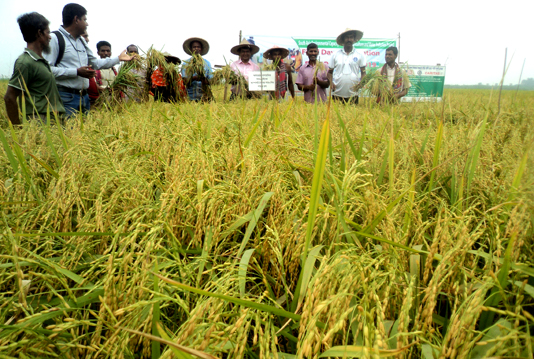RAJSHAHI, April 28, 2019 (BSS)- Farmers have started paddy farming
through using bio-method in the district creating a high hope of protecting
soil health and water from pollution caused by chemical fertilizers and
pesticides.
Around 150 farmers in ten villages under Paba Upazila have cultivated
paddy on 15 acres of land during the current season after getting technical
support of ‘South Asia Environmental Capacity Building – Agricultural and
Water Pollution Project’.
The farmers applied half-rated chemical fertilizer along with optimum
organic fertilizer and bio-pesticide in their paddy fields in order to make
them financially benefited side by side with protecting the soil health.
A crop cutting ceremony was organized at Sharishakuri village under the
upazila to assess the post-harvest yield yesterday. On the occasion, crops
were harvested from two separate demonstration plots, one research and other
farmers practice, in presence of agricultural scientists, researchers,
development activists and farmers.
Caritas Rajshahi Region is implementing the project with the prime
objective of achieving more broad based and sustainable outcomes in health,
food security, environment management and economic opportunity in the region.
“We have provided technical knowledge on proper and effective
application of organic method in farming fields to the targeted farmers,”
said Abul Bashar Molla, Research and Advocacy Officer of the project.
Professor Mijanur Rahman from Department of Geography and Environmental
Science and Professor Giash Uddin Ahmed from Department of Agronomy and
Agriculture in Rajshahi University, Regional Director of Caritas Sukleash
George Costa, National Coordinator of the project Zillur Rahman, Regional
Agriculture Information Officer Abdullah-Hil-Kafi and Huzripara Union
Parishad Chairman Golam Mostofa, among others, were present at the crop-
cutting ceremony.
They also assessed yield of the two plots and found almost equal result
of the two plots. “I have no witnesses any significant variation between
yields of the two plots,” said Enamul Haque, owner of the land.
Talking to BSS on the issue, Prof Mijanur Rahman says integrated efforts
of all the government and non-government entities concerned has become an
urgent need to prevent the land-based water pollution to protect the
habitable environment from all sorts of hazardous condition.
In the present context of exorbitant use of chemical fertilizer and
pesticides in farms, the issue of water and soil pollution is being adjudged
as a serious threat to the public health. The problem, however, can be
mitigated to a greater extent through creating public awareness.
Time has come to replicate the organic method to other areas to protect
the land and water from pollution which is very much important for
environmental balance and ensuring food security, Prof Rahman added.



